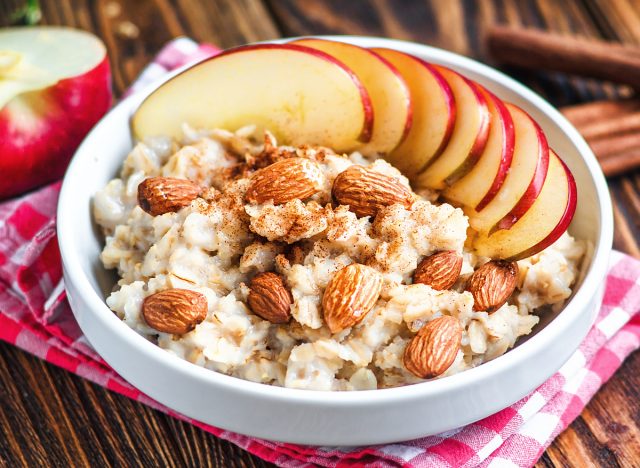Surefire Ways to Lower Your Blood Sugar, Say Dietitians

Maintaining healthy blood sugar levels is necessary for helping to prevent disease now and in the future. The CDC even says that a “healthy blood sugar range” can delay or prevent heart disease, vision loss, and kidney disease, as well as improve your overall mood.
But with this in mind, how do we keep levels at a healthy range?
“There are both short and long-term ways to reduce your blood sugar, but for long-term control, it is best to integrate exercise into your lifestyle, eat a fiber-rich diet, and avoid foods with a low glycemic index,” says Trista Best, MPH, RD, LD at Balance One Supplements.
Side effects of high blood sugar

Your blood sugar levels are something that should always be taken seriously, whether they’re too low or too high. According to Best, “chronic elevated blood sugar can lead to harmful side effects ranging from poor cognition, loss of sight, and decrease in circulation leading to possible amputation.”
While it’s important to get regular checkups from your doctor, there are signs you can look for on your own as well. “The three primary physical signs that your blood sugar may be high include increased thirst, frequent urination, and fainting,” says Best.
Here are a few lifestyle and eating changes that can help you lower your blood sugar. Then, for more healthy eating tips, make sure to check out The 7 Healthiest Foods to Eat Right Now.
Manage your carb intake.

According to Courtney D’Angelo, MS, RD, author at GoWellness, focusing on how many and what type of carbs you eat throughout the day is important in lowering your blood sugar.
“Eating too many carbs can cause blood glucose levels to rise, so having a strong hold on what you’re eating is critical, such as prioritizing whole grains over processed grains, as whole grains provides greater nutritional value while also lowering your blood sugar levels,” says D’Angelo.
Here are The Best Whole Grains To Reduce Your Risk of Disease, Say Dietitians.
Eat more soluble fiber.

Including enough fiber in your diet is not only key in managing your blood sugar levels, but it’s important in maintaining a healthy lifestyle overall.
“In general, fiber slows down carb digestion and sugar absorption, which can help manage blood sugar levels,” says D’Angelo, ” and eating soluble fiber has the ability to improve blood sugar management and minimize blood sugar lows.”
For more soluble fiber in your diet, try incorporating more oats and oatmeal, beans, apples, and citrus fruits.
Get better-quality sleep

Getting enough good-quality sleep is important for your overall health, and without it, your blood sugar levels may suffer.
“Overall, sleep helps maintain blood sugar levels and promotes a healthy weight, so if you’re not getting the sleep your body needs, it will have a hard time functioning even if you’re doing everything else right (ie: eating healthy, exercise, etc.),” says D’Angelo. “Poor sleep can throw off your critical metabolic hormones, which would not help lower your blood sugar levels.”
For more tips on managing blood sugar, read these next:








